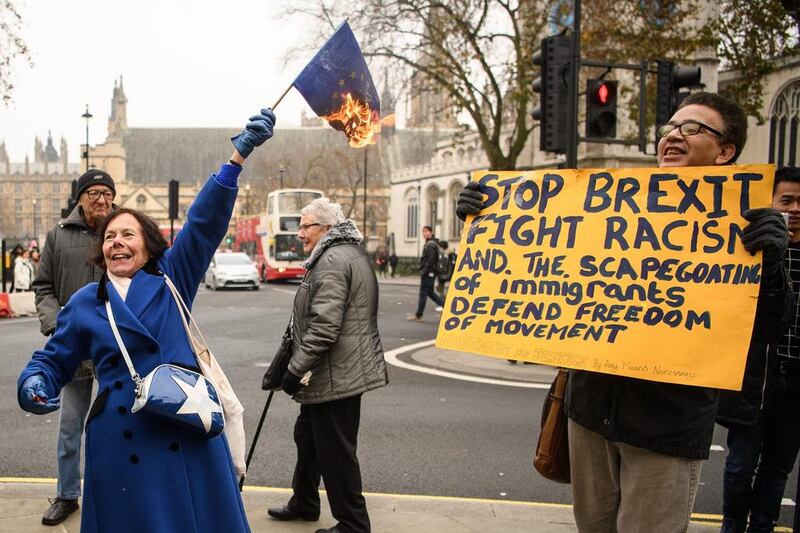The UK parliament going into summer recess last week prompted a rash of articles on “take out the trash day”, the practice of governments getting all their unpopular moves and bad news out on the last day of term to avoid scrutiny.
In truth, Brexit Britain has been blessed with many such opportunities for breezing past bad news.
Ever since the referendum vote to leave the European Union in 2016, there has been an escalation in the exposed blips, false promises, bad planning, chaotic contingencies and questionable practices among leavers-in-chief and government ministers – arriving so fast that there is scant time to pore over them.
In the past weeks alone, we’ve heard that the government has plans to stockpile food and medicines and to rope in the army to deliver it, to prepare for the possibility of Britain crashing out of the EU with no deal.
We've also heard that the official Brexit campaign, Vote Leave, broke electoral law during the EU referendum, exceeding the legal spending limits.
We learned that British Environment Secretary Michael Gove, one of Vote Leave’s figureheads, now thinks that the Brexit campaign was wrong to stoke fears over immigration and Turkey joining the EU.
And we learned that Vote Leave spent millions on Facebook targeted ads and that 45 per cent of those focused on immigration.
Actually, "focused on immigration" is a pretty mild way of describing the panic-mongering ads pumped out by Vote Leave during the referendum campaign – which Facebook was just forced to disclose to a UK government committee investigating fake news.
Millions of people saw adverts depicting a giant red arrow coming from Turkey and projected across Europe, with the accompanying text claiming: “The EU is expanding and plans on granting Turkey visa-free travel. This will put enormous pressure on the NHS, our border security and economy.”
More than 30 Vote Leave Facebook ads mentioned Turkey and dropped in that country’s proximity to Syria and Iraq, again planting the idea that Turkey joining the EU would increase numbers of refuges from those war-torn countries to Europe. One ad simply depicted the UK with the words “5.23 million more immigrants are moving to the UK”.
During the referendum campaign, Mr Gove made claims about Turkey joining the EU. The country is currently not even close to meeting the criteria for applying but he did not let a little detail like that deter a bit of race-baiting.
He also spoke of supposed security concerns attached to Turkey’s potential EU membership while the Vote Leave campaign referred to criminality and high birth rates alongside warnings over imminent waves of Muslim immigration.
Having taken part in attempts to scaremonger over immigration, it’s a bit rich for Mr Gove to now try and distance himself from this approach, call it a mistake and claim the campaign would have had “a slightly different feel” had he been in control of it.
Nobody forced him to make those toxic statements about Turkey. And his airy pronouncements after the fact ooze a sort of casual disregard, typifying the way in which scaremongering sentiments over race and immigration get mainstreamed with scant thought for the consequences for, say, a dark-skinned brother, foreign-accented mother, Polish partner or Muslim neighbour.
Leavers-in-chief constantly claimed that immigration was not the main issue driving the decision to leave the EU, even while polling showed that three-quarters of those worried by the issue voted to leave the EU and despite Leave campaign ads and messages focusing on the issue.
_______________
Read more:
[ Exodus of EU nationals leaves UK hospitality sector in crisis ]
[ The EU project is failing when it comes to migration, economy and the defence ]
[ Watch: Sightline with Tim Marshall on Europe's migrant crisis ]
_______________
In the year following the referendum, the number of reported race hate incidents rose by a third – the highest jump in the six years since records began.
That might in part be down to improvements in monitoring and reporting such incidents but there is also research to suggest the spike is associated with the negative portrayal of migrants during the Brexit campaign.
In May this year, the UN’s special rapporteur on racism, Tendayi Achiume, said Brexit had caused a growth in racism and made people “vulnerable to racial discrimination and intolerance”.
Meanwhile, Britain’s referendum decision to leave the EU is being deployed by far-right populists elsewhere to fire up their anti-immigration fury.
That much was made clear when Donald Trump’s former chief strategist and co-founder of the white nationalist far right Brietbart website, Steve Bannon, announced he is setting up a European branch of The Movement.
It's an attempt to link and boost the anti-immigration, anti-EU far right across Europe. Ironically, it seems that Bannon's efforts to create a right-wing "supergroup" are not being embraced in the manner he might have expected – primarily because EU-hating ethno-nationalists don't really do global solidarity.
As a member of the French far right party, led by Marine Le Pen, told Politico EU: “We reject any supranational entity and we are not participating in the creation of anything with Bannon.”
For progressives, who do quite like international solidarity, the task now is to join up and push back against these damaging, socially divisive sentiments that set up bogus “us or them” narratives around immigration.
When the video of Swedish student activist Elin Ersson stopping the deportation of an Afghan refugee was seen by millions around the world, her brave, solo action reducing many to tears, it showed a hunger for this sort of clear-eyed opposition to anti-immigration sentiments and policies.
If there is any sort of Europe-wide movement, it is surely one that harnesses this strength of feeling and support for collectivism and unity in diversity.





